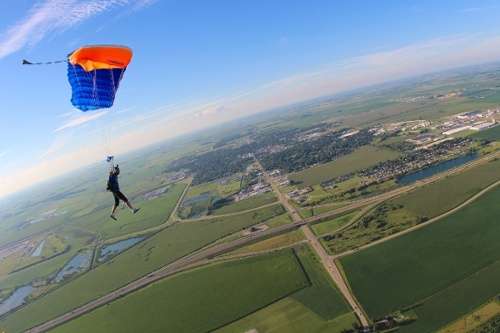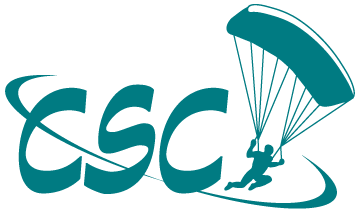Is it possible to skydive alone the first time you jump?
The short answer is no. Skydiving alone requires a license, and it’s also a crucial part of becoming a skydiving instructor.
If you’re not licensed — especially if you’re jumping for the first time — you’ll have to jump as part of a tandem skydive with an instructor.
However, the long answer to this question is more interesting and informative.
In this post, we’ll dive into the details of skydiving for the first time and what it entails.

Can a Beginner Skydive by Themselves?
Most of the new skydivers we encounter ask us, “Can I skydive by myself?”
Unfortunately, no. First-time skydivers are typically strapped to a certified tandem jump instructor during their descent.
This means you also can’t tandem skydive with a friend of yours unless that friend is a licensed skydiving instructor who is a certified tandem instructor.
Why Can't You Skydive Solo on the First Jump?
In a nutshell, you can’t skydive alone for your first time because of safety concerns. While skydiving may look effortless, it requires a a lot of experience and practice to understand what’s happening around you, especially during freefall.
For one, you’ll need to know exactly how all your skydiving gear works, from your equipment to knowing how to deploy your two (main & reserve) parachutes. You’ll also need to be able to read an altimeter and know exactly when to deploy your parachute to allow enough time to slow down before touching ground.
Speaking of which, there’s also the landing. There is a technique to landing your parachute safely, and it takes a skilled pair of hands to pull off a successful landing. The parachute is a tool that’s only as useful as the skydiver who’s flying it, and in the hands of an untrained skydiver, it can be dangerous. Without proper insight on how to land, someone is likely to get injured.
This only covers basic knowledge. There’s also the in-depth techniques someone must master to calmly and expertly react to emergency situations. Though exceptionally rare, emergencies during a skydive require someone who knows what to do in an organized, procedural way so that everyone can reach the ground safely.
At CSC, we’re proud to say that we have a perfect safety record. That is because our tandem skydiving instructors are highly-trained experts who have been trained to react, diagnose, and work through emergency situations.
Finally, it’s important to distinguish “learning” from “doing.” When you make a tandem skydive, you’ll learn about safety. However, you haven’t experienced situations where you need to implement that education. A tandem instructor has.
You’ll have the base-level knowledge you need to ensure you can enjoy your skydive, and your instructor knows everything else — including years of hands-on experience — that makes it happen.
While we know you want the full experience of skydiving, you’ll still get it with a tandem partner! As a skydiving newbie, you can rest easy knowing you’re in safe hands at Chicagoland Skydiving Center — strapped snuggly to a USPA certified tandem instructor and with an required FAA medical exam who’s jumped thousands of times before!
With all of this said, what does it look like for you to solo skydive? What do you need to do to jump out of a perfectly good airplane on your own?
Solo Skydiving License Requirements
When getting behind the wheel of a car for the first time, you had to study and take a written exam before taking an actual driving test. Getting a solo skydiving license is a lot like that! You’ll take classes, perform graded challenges and take a written exam before freefalling.
After passing the practical knowledge exams, your skydiving classes will move from the textbooks to hands on, ground-focused lessons with your equipment, parachute packs, and aircraft.
Finally, there’s your in-air classes, where you’ll learn things like:
- How to properly exit the aircraft and land your parachute
- Proper body positioning and movement during freefall, including controlled turns, barrel rolls, front flips & backflips
- Canopy skills, such as how to control it during the descent and landing
- Emergency procedures , i.e. what to do if something goes wrong
- Etc.
After a few weeks of hard work, you'll earn a solo skydiving license!
Preparing for Your First Skydive
Before worrying about taking skydiving classes and earning a solo freefall license, remember that your first few jumps will be with a professional instructor— sure to get you to the ground safely.
After you pull the trigger and set up a jump date, take your preparation to the next level by downloading our Tandem Skydiving for First-Timers guide, which contains everything you need to know for your big jump.



